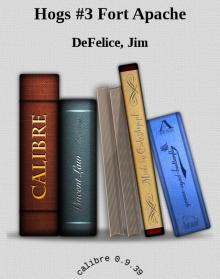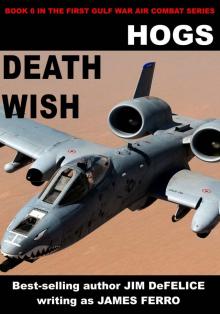- Home
- DeFelice, Jim
Hogs #4:Snake Eaters
Hogs #4:Snake Eaters Read online
HOGS 4
Air War in the Gulf
SNAKE EATERS
By Jim DeFelice
Book #4 in the HOGS air war series based on the exploits of the A-10A Warthog pilots in the 1991 Gulf War
Copyright © 2001 by Jim DeFelice
Thanks for purchasing this e-book.
All proceeds directly benefit the author who imagined, created, researched, and wrote it.
Table of Contents
Table of Contents
Prologue
___PART ONE___
CHAPTER 1
Chapter 2
Chapter 3
Chapter4
Chapter 5
Chapter 6
Chapter 7
Chapter 8
Chapter 9
Chapter 10
Chapter11
Chapter 12
Chapter13
Chapter14
Chapter 15
Chapter 16
Chapter 17
Chapter 18
Chapter 19
Chapter20
Chapter21
Chapter 22
___PART TWO___
Chapter 23
Chapter 24
Chapter 25
Chapter 26
Chapter27
Chapter28
Chapter 29
Chapter 30
Chapter 31
___PART THREE___
Chapter 32
Chapter 33
Chapter 34
Chapter 35
Chapter 36
Chapter 37
Chapter 38
Chapter 39
Chapter 40
Chapter 41
Chapter 42
Chapter 43
Chapter 44
Chapter 45
Chapter 46
Chapter 47
Chapter 48
Chapter 49
Chapter 50
Chapter 51
Chapter 52
Chapter 53
Chapter 54
Chapter 55
___EPILOGUE___
Chapter 56
Chapter 57
Chapter 58
Author’s Note
Other Books
Prologue
NORTHWESTERN SAUDI ARABIA
26 JANUARY 1991
1200 (ALL DATES & TIMES LOCAL)
The chaplain had only just arrived in the Gulf. He was very new to the Army, but was a sensitive man and conscientious, convinced that God had sent him here to do some good.
But how? His first service was scheduled for this very afternoon, and he couldn’t think of anything to say in his sermon, or at least nothing that would be inspiring. The men here were on the front line, the tripwire of the allied defense. At any second, Saddam’s minions could appear over the next sand dune and overwhelm them. He needed something powerful to encourage and comfort them. But he could think of nothing.
Finally, the minister decided to seek inspiration from the desert itself. He walked out from the sandbags and strolled into the open sand, shading his eyes from the sun overhead. He gazed across the undulating land, trying to imagine what this desert might have been like three or four thousand years before, when God had come among the Israelites and smote their enemies.
At that instant, the ground trembled and the chaplain felt himself being thrown down by the force of a heavenly wind. He writhed in the sand, certain that he was experiencing heavenly enlightenment.
Or worse.
Turning his eyes upward, he saw not an angel but a black-green monster, ugly and ferocious, breathing fire. It roared overhead, shaking the marrow of his bones.
It took the minister a moment to realize it was not an apparition, and then another moment to connect the monster to a briefing one of the soldiers had given him earlier. The sandbagged-position was directly in a flight line used by some of the Allied Coalition fighter bombers returning from missions north. The plane was an A-10A Warthog, heading for a nearby airbase to reload and refuel for another sortie.
The minister felt more than a little embarrassed as he pulled himself from the ground. But then he realized that it had, after all, been a message; if not entirely divine, certainly useful.
“The Apocalypse. Revelations. Of course,” he said, brushing the sand from his trousers as he ran back to write his sermon.
It was later said to be the best ever preached in Saudi Arabia.
PART ONE
IN THE MUD
CHAPTER 1
IRAQ
26 JANUARY 1991
1205
Fear made him stand up. Fear cocked his arm and straightened his legs. Fear snapped his finger on the Beretta’s trigger, once, twice. Fear was everything he was, everything he felt, everything he did.
The Iraqi soldier fell to the ground.
Lieutenant William “BJ” Dixon ran forward and grabbed the man’s fallen Kalashnikov rifle. There were shouts and footsteps in the rock quarry behind the soldier he’d just killed. He squatted, assault gun in his hand. He leaned forward to kneel and waited.
Finally, a pistol and then an arm appeared around the corner. The gun fired two, three times, without aiming. One of the bullets ricocheted off the sheer rock next to Dixon, but he did not flinch. He was beyond flinching. He waited for a clear shot.
The hand drew back. Dixon waited. Finally, a face, baffled, scared, poked out from behind the corner.
Dixon pressed the rifle against his side as he pushed the trigger.
In the instant between reflex and reaction, he realized it was his own fear he saw in the man’s face. By rights, Dixon shouldn’t be here in the middle of Iraq, closer to Baghdad than Riyadh. By rights, he should be lying dead on the next hillside where the Delta Force commando patrol he’d been working with as a ground controller had been ambushed and pinned down.
The moment passed. He fired a quick burst from the Russian-made automatic rifle; two of the three bullets struck the Iraqi, the first directly through the man’s heart. Dixon jumped up and ran forward, throwing himself to the ground as he reached the body. Falling past the corner of the sheer rock wall, he fired in the direction the man had come from.
Luck and surprise caught two more Iraqis cold, both barely three yards away. Bullets spewed from Dixon’s gun until it clicked empty.
He rolled upwards, pushing his knee under him and using it to spring along the rock wall toward the two bodies. There were no other Iraqis that he could see. He threw away his empty rifle and grabbed one that had fallen between the two men. As he took it, he looked into the face of one of the soldiers.
The man gasped for breath. Tears streamed down the sides of his face.
Dixon saw that the man wore a belt across his chest with extra clips for the Kalashnikov. He reached down, curled his fingers around the canvas straps, and yanked it free with an immense heave.
The man screamed. His chest and stomach blotted with a fresh spurge of blood. His yelp turned into a spew of vomit.
To shoot him now would be a great mercy.
Dixon hesitated.
Blood mixed with the vomit sputtering from the man’s mouth. He moved his lips, trying to say something.
Less than a week ago, Dixon was merely a pilot; a Hog driver. He’d never dealt with something like this; it simply hadn’t existed for him. He had never looked so closely at death.
That was irrelevant now. His past lay in the ruined smoke of a nearby storage bunker, a probable NBC or nuclear-bacterial-chemical facility the Delta team had targeted for Dixon’s A-10A unit, the 535th Tactical Fighter Squadron, the Devil’s Hogs. Everything Dixon had done until now, from shooting down a helicopter early in the air war to rescuing a Spec Ops sergeant a few hours ago, no longer mattere
d.
Fear was all. Fear and survival. He had to get the hell out of here before more Iraqis came. He had to run, right now, if he was going to live. There was no time for mercy.
The lieutenant closed his eyes and took a few steps away. Then he cursed and went to the man, forcing himself to look as he pressed the muzzle to the soft temple of the agonized Iraqi and took away his pain forever.
CHAPTER 2
FORT APACHE, IRAQ
26 JANUARY 1991
1205
Captain John “Doberman” Glenon heaved himself over the side of the A-10A cockpit, balancing precariously on the narrow steps of the attack plane’s crank-down ladder. Doberman considered himself, without doubt, the luckiest man in the Gulf. He had just managed an emergency landing on a scratch strip controlled by American Special Operations Forces nearly a hundred miles deep in the Iraqi desert. With less than a sneeze worth of fuel in the sump at the bottom of his tanks, he’d fought off a last-second mechanical problem and parked his Hog ten feet from the end of the dangerously short strip.
Until today, Doberman had never really believed in luck. Now he’d belly up to a Lotto machine, blow a year’s pay, and consider it an investment. He felt like he’d just nailed the prom queen.
The desert sun boiled off some of his exhilaration as the soles of his feet scraped along the grit of the sand-swept runway. He was alive against all odds— but he was also deep inside enemy territory, on the ground, with no jet fuel and no chance of getting some anytime soon. The concrete life raft he stood on was protected by less than a dozen Delta Force troopers and a handful of combat engineers who were working feverishly to throw up some sort of defense.
And less than a half-hour before, he’d seen the body of a fellow squadron member sprawled in a rock quarry he and his wingmate had targeted for destruction. Lieutenant William “BJ” Dixon had been a nugget with a knack for getting his butt into places where it didn’t belong, but that had only made Doberman liked him all the more.
“Hey, Dog Man!” Doberman’s wingmate, Captain Thomas “A-Bomb” O’Rourke, ambled over. A-Bomb’s burly body hung half out of his flightsuit. “Where you figure they got the coffee going?”
“What makes you think they got coffee?” said Doberman.
“Green Berets always have coffee,” said A-Bomb. “It’s one of the requirements. Like being an NCO. Spec Ops run special courses on making it under fire.”
Doberman shielded his eyes against the sand and sun as he stared at A-Bomb’s round face. It was hard to tell sometimes whether his wingmate was kidding or not.
Odds were he wasn’t. There were only two things A-Bomb considered sacred: driving Hogs and coffee. He was undoubtedly the only attack pilot in the Air Force who carried a thermos of joe into battle.
“You will find coffee in the second dugout beyond the cement foundation,” said a voice behind them. “Though I would note that the use of the word ‘coffee’ stretches the definition beyond reasonable tolerance.”
Doberman spun around. Only one person in the Gulf spoke like that— Captain Bristol Wong, a Pentagon intelligence analyst who’d had the misfortune of wandering into Devil Squadron’s readyroom shortly after the air war began. He had been promptly shanghaied as the unit’s resident expert on Russian-made air defenses. Despite his prissy nature, Wong was actually a man of considerable talents; he had performed a tandem high-altitude jump earlier in the day to deliver a mechanic to the covert base.
The mechanic happened to be another member of Devil Squadron, Technical Sergeant Rebecca “Becky” Rosen.
Female Technical Sergeant, whose presence here violated any number of regulations, military necessity or not. It was as boneheaded a move as any Doberman had ever heard of.
“Hey Braniac, how was the parachutin’?” asked A-Bomb, slapping Wong on the back so hard the sharp creases momentarily disappeared from the captain’s Spec Ops chocolate-chip camo fatigues. But only momentarily.
Wong carefully removed A-Bomb’s hand from his back.
“The parachuting, Captain, was an elementary operation that could have been accomplished by any member of the Special Forces command. Obviously, I was assigned because Colonel Klee decided he didn’t want me at his base.”
“Gee, you think?” asked A-Bomb.
“As for your being angry with me, Captain Glenon, as I can tell by your red cheeks,” Wong nodded in Doberman’s direction, “I would suggest that the emotion is misdirected. Colonel Klee gave a direct order. I merely carried it out.”
“Klee’s an ass,” spit Doberman.
“Undoubtedly. Nonetheless, given the contingencies involved, his order appeared lawful,” added Wong. “And thus I saw it as my duty to carry it out. A fortuitous event, in any case.”
“How do you figure that?”
“There is now a mechanic here to see after your planes, as well as the helicopters,” said Wong.
Rosen was hardly an expert on helicopters, which were Army aircraft, not Air Force. But before Doberman could say anything more, they were interrupted by a sun-burned middle linebacker who turned out to be the captain in charge of the base.
“I’m Hawkins,” said the man, shoving his fat hand into Doberman’s. “Welcome to Fort Apache.”
Hawkins wore a generic camo uniform without markings of unit or rank, but the snap in his voice left no doubt that he was in charge. He’d also been wounded. There was a thick wrap around his mid-section and another on one of his legs. His rolled up sleeves revealed a series of scrapes and gashes covered with caked-up anti-bacterial ointment. But there was no hint from his manner, let alone his quick movements, that any of these injuries had affected him.
Doberman, who at five-four was short even for a pilot, shook his hand and walked with him to his command post, a makeshift bunker in the concrete ruins.
Fort Apache had been established barely twenty-four hours earlier by Hawkins and his team. It served as a staging and command center for American and British special ops troops looking for Scuds further north in Iraq. The concrete landing strip had been started as an airbase some years before by the Iraqis, and then mysteriously abandoned. Located about five miles from the nearest highway, the concrete strip was surrounded by scrubland and desert. Two AH-6 Little Birds, armed scout helicopters specially adapted to “black” missions, had been assigned to Hawkins team. They were hidden beneath desert-colored tarps just off the concrete.
The original plan had called for Hawkins’ team to capture the strip and lengthen it to at least two thousand feet. That would make it long enough for emergency landings and takeoffs by stricken allied craft heavier than the Hogs. It would also accommodate a four-engined MC-130, the Spec Ops chariot of choice. A specially modified model equipped with an airborne cannon as well as supplies and troops was cooling its heels at Al Jouf, more than a hundred miles away, waiting to make the run north.
It looked like it was going to be waiting a long while. Hawkins had discovered two immense wadis that ran along the ends of the concrete. The dry creek beds could not be filled without massive amounts of debris and cement: even then, the engineers feared the ground would give way under heavy use. Working with prefab steel mesh, the engineers had managed to lengthen the strip to about fifteen hundred feet. But that was it. They had no chance of getting the strip long enough for the intended operations.
“Herky pilot says he could get in if we need him,” Hawkins told Doberman and A-Bomb after they had shed their survival gear. “But there’s no way he can land his C-130 with any sort of load. We’re hoping to get a Pave-Low up with fuel for the helicopters tonight. At the moment I have barely enough in case we have to bug out.”
“What about us?” asked Doberman.
Hawkins frowned.
“Shit,” said Doberman.
“We may be able to run some more fuel up on another Pave-Low tomorrow night,” said Hawkins. “Or maybe they can figure out some sort of drop.”
“Shit, dump some of this coffee in the bladders, Hog’l
l purr like a kitten,” said A-Bomb, draining his cup.
“The proximity of Iraqi installations make Pave-Low flights a precarious proposition,” said Wong, belatedly joining the discussion. “The MH-53 family has a significantly larger detection profile. They are likely to be seen as well as heard, if not actually scanned by radar. Their flights would comprise the usefulness of the base, especially if more than one craft was required.”
“And a Herky Bird wouldn’t?” said Doberman.
“A C-130 could, in theory, descend from altitude in a non-apparent trajectory,” said Wong.
“Which means what?” Intel specialists tended to rub Doberman the wrong way, but Wong was in a class of his own.
“I think he means they could make it look like it was going somewhere else,” said Hawkins. He said it like he not only understood but liked Wong— a truly scary thought.
“Correct. But in any event, I would not like to wager on a C-130 landing here, let alone it taking off,” said Wong. “As your landings demonstrated, even the A-10A Thunderbolt II has difficulty, despite its innate short-field capabilities.”
“Nah,” said A-Bomb. “We were just trying to make it look tough.”
Wong twisted his nose, as if his tongue were a windup toy. “At forward-strip weight, the A-10A needs 396 meters to land and 442 meters to take off. Now, depending on the ordnance configuration and fuel load, wind, ambient temperature. . .”
“Thanks Wong, I know the math,” snapped Doberman. “I just landed, remember?”
“Face it, Dog Man, we’re just ground soldiers now,” said A-Bomb joyfully. “Mud fighters. Snake eaters.”
“If you can handle a gun, you can take a turn as a sentry,” said Hawkins.
“That’s what I’m talking about,” said A-Bomb, jumping up. “Give me a 203 and I’ll be happy.”
Before Doberman could ask what the hell a 203 was, Technical Sergeant Rosen entered the bunker.
“Captains.”
Like any experienced sergeant, she said the word in a way that it made it seem she was referring to an inferior rank.

 Hogs #1: Going Deep
Hogs #1: Going Deep Hogs #2: Hog Down
Hogs #2: Hog Down Hogs #4:Snake Eaters
Hogs #4:Snake Eaters Hogs #3 Fort Apache
Hogs #3 Fort Apache HOGS #6 Death Wish (Jim DeFelice’s HOGS First Gulf War series)
HOGS #6 Death Wish (Jim DeFelice’s HOGS First Gulf War series)